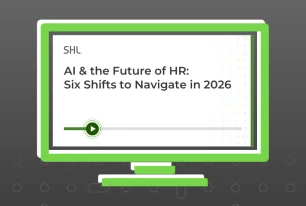Retail Talent, Universal Skills: A Hidden Goldmine for Every Industry
With rapidly shifting consumer behaviors and digital transformation, those employed in retail have needed to show adaptability more than most. Our research identified eleven key skills that are critical to success and shows why retail candidates show strengths that sets them up to succeed across any industry.
Share
Digital transformation is both a disruptor and an enabler
Retailers are investing in AI and automation tools to face the challenge of stagnant growth, higher competition and changing consumer demands. With this upheaval, job roles will change, new skills will be required, and employees will need to adapt. Digital innovation will also bring new investment into workforce growth and empowerment through e-learning, development and upskilling/reskilling initiatives that can ensure employees thrive in this new era.
From our recent research, we identified eleven skills broadly outline what organizations should look for when hiring, developing or mobilizing retail talent.
Skills that matter in retail:
- Puts customers first
Employees that put customers first, seek to understand customer needs and aim for high-quality service should be valued. They will be able to turn complaints into solutions and help ensure shoppers feel valued and supported. - Considers financial impact
Understanding what drives profits, for example focusing on top-selling items, reducing waste, and spotting risks early helps stay successful in a highly competitive landscape. - Coordinates others’ work
Organizing tasks and activities effectively and ensuring the right people are focused on the right job keeps teams productive, and stores running efficiently. - Supports and coaches others
Creating a learning culture with resources to develop those skills that matter will help share knowledge, keep engagement high, and help reduce staff turnover. - Sets objectives
Retail employees need clear goals and timelines to stay on track. Whether hitting sales targets, managing logistics, or completing regular tasks, breaking objectives into manageable milestones ensure steady progress and smooth daily operations. - Manages resources
Effective resource management is key in retail. From stock levels and staffing needs, to store and customer demands, those that can adjust quickly to anticipate busy periods, prevent shortages, and keep operations running smoothly will be crucial. - Applies functional expertise
The ability to learn about products, services, and store operations and apply this knowledge to assist customers, handle queries, and support colleagues will enable effective handling of changing product lines, customer demands and seasonality. - Operates job related technology
Retail employees need to be aware of, and quickly learn new technologies that can be used to boost efficiency and streamline operations, this includes everything from POS systems to online tools and inventory apps. - Gathers information
With so many sources of data on products, customers and operations, people that can gather information to make smart, accurate informed decisions will deliver a reliable customer experience. - Complies with rules and regulations
It is important that the workforce is committed to store policies and compliance procedures to ensure a safe, consistent, and professional environment for customers and colleagues. - Show safety awareness
Following on from compliance, retail employees should follow health and safety procedures, handling equipment responsibly, and performing regular safety checks to minimize risks that could be catastrophic for the business.
Discover which of these skills retail candidates showed strengths in, and how they compare to other industries by downloading our report:
Bridging the Skills Gap: Essential Skills for Success Across Key Industries
Retail Talent Is Being Poached. Retain or Lose Out
The clock is ticking for retailers: talent is not just sought after by competitors within retail but aggressively targeted by industries far beyond the sector.
Our research reveals that retail employees possess a powerhouse of transferable skills making them hot commodities in today’s talent wars. Retail candidates consistently outperformed the general population across a wide spectrum of skills, including ‘Delivering Results,’ ‘Adaptability,’ ‘Commercial Thinking,’ and ‘Collaboration.’
This breadth of ability positions retail professionals to transition more easily into roles in other industries, where their skills can drive success and innovation. Here’s why competitors outside retail are eyeing retail talent, and why retailers need to double down on retention and mobility now:
- IT: The ability to “Coordinate others’ work” is a significant skills gap among IT candidates, yet it is a notable strength for those with retail experience. Their knack for managing workflows and driving execution gives them a clear edge—an edge rarely found in typical IT hires.
- Healthcare: “Fostering team cohesion” is crucial for success in healthcare, yet healthcare struggles to find it. Retail candidates consistently score highly in this area, suggesting they can bring valuable team-building capabilities to healthcare environments.
- Financial Services: Innovation is fueling the future of financial services, but the skill of “Generating new ideas” was shown to be lacking amongst candidates. Retail professionals excel here, indicating they could inject fresh thinking and creativity into the sector.
By adopting a skills-based approach and considering candidates from retail backgrounds, organizations can tap into a pool of high-quality individuals whose full potential may not yet have been realized.
For those leading retail teams, having a workforce with transferable skills increases the importance of employee engagement, retention and effective talent mobility. Unlocking and nurturing these skills will be the difference between losing the best talent to other sectors or turning retail organizations into a long-term career.
Learn how to retain the skills and knowledge of your best talent by empowering employees to perform the jobs of tomorrow.









